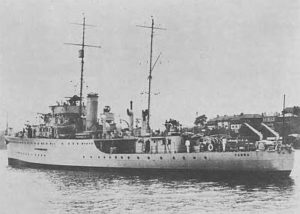- Author
- Duffy, Monsignor C.J.
- Subjects
- None noted
- Tags
-
- RAN Ships
- None noted.
- Publication
- August 1972 edition of the Naval Historical Review (all rights reserved)

This personal biography of the Captain of HMAS Yarra of World War II was delivered as a lecture to the February 1972 meeting of the Society. Monsignor Duffy, President of the Australian Catholic Historical Society, speaks of his cousin.
MY INTENTION IN PUTTING ON RECORD a short biography of Robert William Rankin, RAN, is a double one, to keep alive his memory and to sketch the environment of the Navy in its earlier days of fifty years ago for this modern generation.
He was my cousin, we grew up in the same town. He was close to me during his formative years and remained a close friend until he died. I can then draw on my own memories as well as on those of his older brother, John Rankin, in addition to official records. It is possible that there could be minor inaccuracies but as my memory is rather tenacious of a man who made a deep impression on me, I think what I write is correct. His career had uniquely significant features.
The Rankin family stems from Scottish settlers planted in Northern Ireland after the invasion of Cromwell. They were Presbyterians and Orangemen. A number of brothers, five I heard, came to Australia about 1850 and scattered over three states, Queensland, Victoria and New South Wales.
One of them, Robert, made his way over the Blue Mountains and found employment with bullock waggons which used to carry goods ahead of the railhead into the interior, helping to push settlement far to the West. This means that he had no permanent home during his middle age and his address shifted from Bathurst, to Dubbo and then on to Cobar, and beyond even to a new mining village called Drysdale.
In Bathurst he married Mary Theresa Sullivan, a girl who contrasted with him in every characteristic. He was tall, she petite, he was an extrovert, she was demure and refined, she was the daughter of Irish immigrants and devoted Catholics. She had been in Bathurst in 1854 and in due time three boys and two girls were born to them. My mother arrived while they were in Dubbo and Jack, the youngest of the family and the future father of Robert, would have been born in Cobar.
Mary Rankin was courted by a young solicitor, Michael Duffy, my father, and so was able to use some of the newly acquired money to send her brother Jack to St. Joseph’s College, Hunter’s Hill, of which Duffy was an ex-student. Exquisite penmanship was one skill he acquired there to stand him in good stead later as a clerk.
It should be mentioned that none of the boys ever changed from the nominal Presbyterianism of the father. Jack met and married the daughter of the caretaker of the Masonic Hall of Cobar, Florence Rankin, who bore him three children, Jack, Robert and Jeanie.
The outbreak of the 1914 war changed his life. He enlisted and served overseas for the duration.
The children remained unbaptized for years and eventually a Catholic aunt got the commission to attend to that detail wherever she wished. Thus it was that almost by accident Robert gave his allegiance to the Church to which he became completely attached.
Robert’s birthday was June 3 1907. Most of his schooling was at the State School in Merrylands until he won a bursary to the Parramatta High School in 1920. Within another year he was awarded a further scholarship to Jervis Bay. His scholastic ability and hard work kept him in first or second place in all branches of study. Sporting prowess was equally prominent and placed him in the first grade of cricket, football, hockey, tennis, soccer, and distance swimming and he played for combined services.
With his brother he gave the same attention to religious studies, and they were chosen by Archbishop Kelly as the outstanding pupils when he administered confirmation while they attended the state school.
On arrival at Jervis Bay on 1st January 1921, he received a knockback coupled with the threat of expulsion. The reason for this unexpected shock was religion.
He was asked why he had misled the authorities by saying that he was a Presbyterian? The enquiry disclosed the fact that in filling in the information paper his father had given his own religious affiliation, instead of that of his son.
Evidently at that time religion was a touchy subject at the Naval College. Robert found that the only other Catholic with him was the son of a Cabinet Minister. His only disciplinary encounter with an officer resulted from a fight with a companion who made a nasty remark about his religion.
Standing up for his rights at a later stage he pointed out that no provision had been made for months for the visit of a Catholic chaplain, a situation which was at once rectified.
After graduation in 1925 Rankin served in many ships. They were HMA Ships Brisbane and Melbourne, HM Ships Frobisher, Valiant, Viscount and Eagle, HMA Ships Canberra, ANZAC, Albatross, Cerberus, Moresby and Penguin, HM Ships Gleaner, Blackswan and Resource. In September 1941 he was serving in HMAS Penguin.
His dedication to his profession was absolute. Loyalty was the keystone of his character, whether it manifested itself in his faith, in his naval service or in his personal relationships. He could not conceive letting down anyone. Once he said to me, at our last meeting before he took over his final posting – we were having a meal at the Australia and he was talking of the war – ‘A man in my position should not marry. My destiny is to go down with my ship, which is not fair to a wife and family’.
His mother had first place in his thoughts at all times. She had always suffered from deafness but this made no difference to her skill as a dressmaker, and all through the depression she worked constantly to continue the educational opportunities of her family. Robert idolised her and made it his first priority to purchase a good home, to be hers for life without expense of any kind. It was the home to which he returned for every leave.
The sailors under his charge had next call on him. He made sure that if only one wireless set was functioning on his ship that it was in the men’s mess. He would pick up a member of his crew and give him a lift if a long distance had to be covered. On Sundays, in the frequent absence of a chaplain he collected the Catholics for a form of divine service.

His integrity in dealing with other people received a worthy acknowledgment when a man called at his home once to pay him particular thanks for never ever having been a day late in the monthly payment of the amount due in the purchase of a property. He was in no hurry to marry and even after becoming engaged, took his time before going to the altar. The circumstances of his engagement were something like this. While on surveying work around the northern waters his ship was based at Thursday Island where available female companions were scarce. One of these was a Miss Broughton, a descendant of the pioneer Anglican Bishop of Australia and after seeing a lot of one another they became engaged.
He then sailed back to England for further service with the British Navy, and as he told me, he renewed the friendship with the people who had entertained him previously, and enjoyed his shore leave as much as ever.
On his return, with the stern prospects of war service ahead he seriously considered putting off marriage for the time being, but having given his word, he stuck to it and a full naval marriage was solemnised in St. Stephen’s Cathedral in Brisbane.
They set up home in Sydney and a daughter, Patricia, was born to them. She and her future then became a main preoccupation because with the uncertain outcome of war service he planned for any eventuality. He provided for her education and made a Will in which he bequeathed to her his estate, to be held in trust until her twenty-first birthday.
The time was now near at hand for him to take over his first and last command and what follows in this paper is taken from the newspaper reports which gave great prominence to the exploits of the sloop HMAS Yarra, which he took over in Singapore in January 1942 for the final two months of her existence and his two months of glory.




